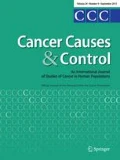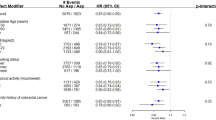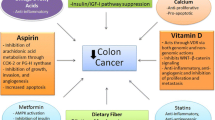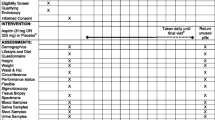Abstract
Obesity is a risk factor for colon cancer, possibly due to elevated levels of circulating cytokines derived from adipose tissue. Aspirin, which may affect the levels of these cytokines, has been shown in randomized controlled trials to decrease the risk of colorectal adenomas. We hypothesized that the chemopreventive effect of aspirin might be greater in individuals with higher body mass index (BMI). Data were available from the Aspirin/Folate Polyp Prevention Study, a randomized controlled trial of aspirin and folic acid to prevent recurrent colorectal adenomas. Obesity was defined as BMI ≥ 30 (kg/m2), overweight as BMI of 25–29 (kg/m2) and normal weight as BMI <25 (kg/m2). For the analysis of the effect of aspirin on the recurrence of colorectal adenoma by BMI, we computed risk ratios for aspirin versus placebo within the three BMI strata using a modified Poisson model. Overall the risk reduction of adenomas with a daily dose of 325 mg aspirin was greater among subjects with higher BMI. Among obese subjects the risk ratio (RR) for advanced adenomas compared with placebo was 0.44 (95% CI 0.17–1.10), versus RR = 1.23 (95% CI 0.55–2.77) among those with normal weight. However, 81 mg aspirin daily did not interact with BMI to modify the risk of adenomas in such a fashion. The more pronounced effect of 325 mg aspirin in individuals with higher BMI suggests a possible protective role of anti-inflammatory aspirin against increased adipose-driven cytokines among obese subjects.
Similar content being viewed by others
References
Murphy TK, Calle EE, Rodriguez C, Kahn HS, Thun MJ (2000) Body Mass index and colon cancer mortality in a large prospective study. Am J Epidemiol 152: 847–854
Calle EE, Kaaks R (2004) Overweight, obesity and cancer: epidemiological evidence and proposed mechanisms. Nat Rev Cancer 4: 579–91
Giovannucci E, Ascherio A, Rimm EB, Colditz GA, Stampfer MJ, Willett WC (1995) Physical activity, obesity, and risk for colon cancer and adenoma in men. Ann Intern Med 122: 327–334
Giovannucci E, Colditz GA, Stampfer MJ, Willett WC (1996) Physical activity, obesity, and risk of colorectal adenoma in women (United States). Cancer Causes Control 7: 253–263
Terry MB, Neugut AI, Bostick RM, Sandler RS, Haile RW, Jacobson JS (2002) Risk factors for advanced colorectal adenomas: a pooled analysis. Cancer Epidemiol Biomarkers Prev 11: 622–629
Almendingen K, Hofstad B, Vatn MH (2001) Does high body fatness increase the risk of presence and growth of colorectal adenomas followed up in situ for 3 years? Am J Gastroenterol 96: 2238–2246
Calle EE, Thun MJ (2004) Obesity and cancer. Oncogene 23: 6365–6378
Das UN (2001) Is obesity an inflammatory condition? Nutrition 17: 953–966
Erlinger TP, Platz EA, Rifai N, Helzlsouer KJ (2004) C-reactive protein and the risk of incident colorectal cancer. JAMA 291: 585–590
Zhang SM, Buring JE, Lee IM, Cook NR, Ridker PM (2005) C-reactive protein levels are not associated with increased risk for colorectal cancer in women. Ann Intern Med 142: 425–432
Baron JA, Cole BF, Sandler RS et al (2003) A randomized trial of aspirin to prevent colorectal adenomas. N Engl J Med 348: 891–899
Sandler RS, Halabi S, Baron JA et al (2003) A randomized trial of aspirin to prevent colorectal adenomas in patients with previous colorectal cancer. New Engl J Med 348: 883–890
Zha S, Yegnasubramanian V, Nelson WG, Isaacs WB, De Marzo AM (2004) Cyclooxygenases in cancer: progress and perspective. Cancer Lett 215: 1–20
Macarthur M, Hold GL, El Omar EM (2004) Inflammation and Cancer II. Role of chronic inflammation and cytokine gene polymorphisms in the pathogenesis of gastrointestinal malignancy. Am J Physiol Gastrointest Liver Physiol 286: G515–G520
Macarthur M, Hold GL, El Omar EM (2004) Inflammation and Cancer II. Role of chronic inflammation and cytokine gene polymorphisms in the pathogenesis of gastrointestinal malignancy. Am J Physiol Gastrointest Liver Physiol 286: G515–G520
WHO Consultation on Obesity. Obesity: Preventing and managing the Global Epidemic. 894. 1997. Geneva, World Health Organization. WHO Technical Report Series (TRS)
Zou G (2004) A Modified Poisson Regression Approach to Prospective Studies with Binary Data. Am J Epidemiol 159: 702–706
Greenland S (2004) Model-based estimation of relative risks and Other epidemiologic measures in studies of common outcomes and in case-control Studies. Am J Epidemiol 160: 301–305
Ikonomidis I, Andreotti F, Economou E, Stefanadis C, Toutouzas P, Nihoyannopoulos P (1999) Increased proinflammatory cytokines in patients with chronic stable angina and their reduction by aspirin. Circulation 100: 793–798
Solheim S, Arnesen H, Eikvar L, Hurlen M, Seljeflot I (2003) Influence of aspirin on inflammatory markers in patients after acute myocardial infarction. Am J Cardiol 92: 843–845
Feldman M, Jialal I, Devaraj S, Cryer B (2001) Effects of low-dose aspirin on serum C-reactive protein and thromboxane B2 concentrations: a placebo-controlled study using a highly sensitive C-reactive protein assay. J Am Coll Cardiol 37: 2036–2041
Feng D, Tracy RP, Lipinska I, Murillo J, McKenna C, Tofler GH (2000) Effect of short-term aspirin use on C-reactive protein. J Thromb Thrombolysis 9: 37–41
Patrono C, Coller B, FitzGerald GA, Hirsh J, Roth G (2004) Platelet-active drugs: the relationships among dose, effectiveness, and side effects: the Seventh ACCP Conference on Antithrombotic and Thrombolytic Therapy. Chest 126: 234S–64S
Feldman M, Jialal I, Devaraj S, Cryer B (2001) Effects of low-dose aspirin on serum C-reactive protein and thromboxane B2 concentrations: a placebo-controlled study using a highly sensitive C-reactive protein assay. J Am Coll Cardiol 37: 2036–2041
Author information
Authors and Affiliations
Corresponding author
Additional information
This work was supported in part by grants from the National Institutes of Health P30 DK34987, R01 CA59005, RR000046.
Rights and permissions
About this article
Cite this article
Kim, S., Baron, J.A., Mott, L.A. et al. Aspirin may be more effective in preventing colorectal adenomas in patients with higher BMI (United States). Cancer Causes Control 17, 1299–1304 (2006). https://doi.org/10.1007/s10552-006-0075-x
Received:
Accepted:
Issue Date:
DOI: https://doi.org/10.1007/s10552-006-0075-x




